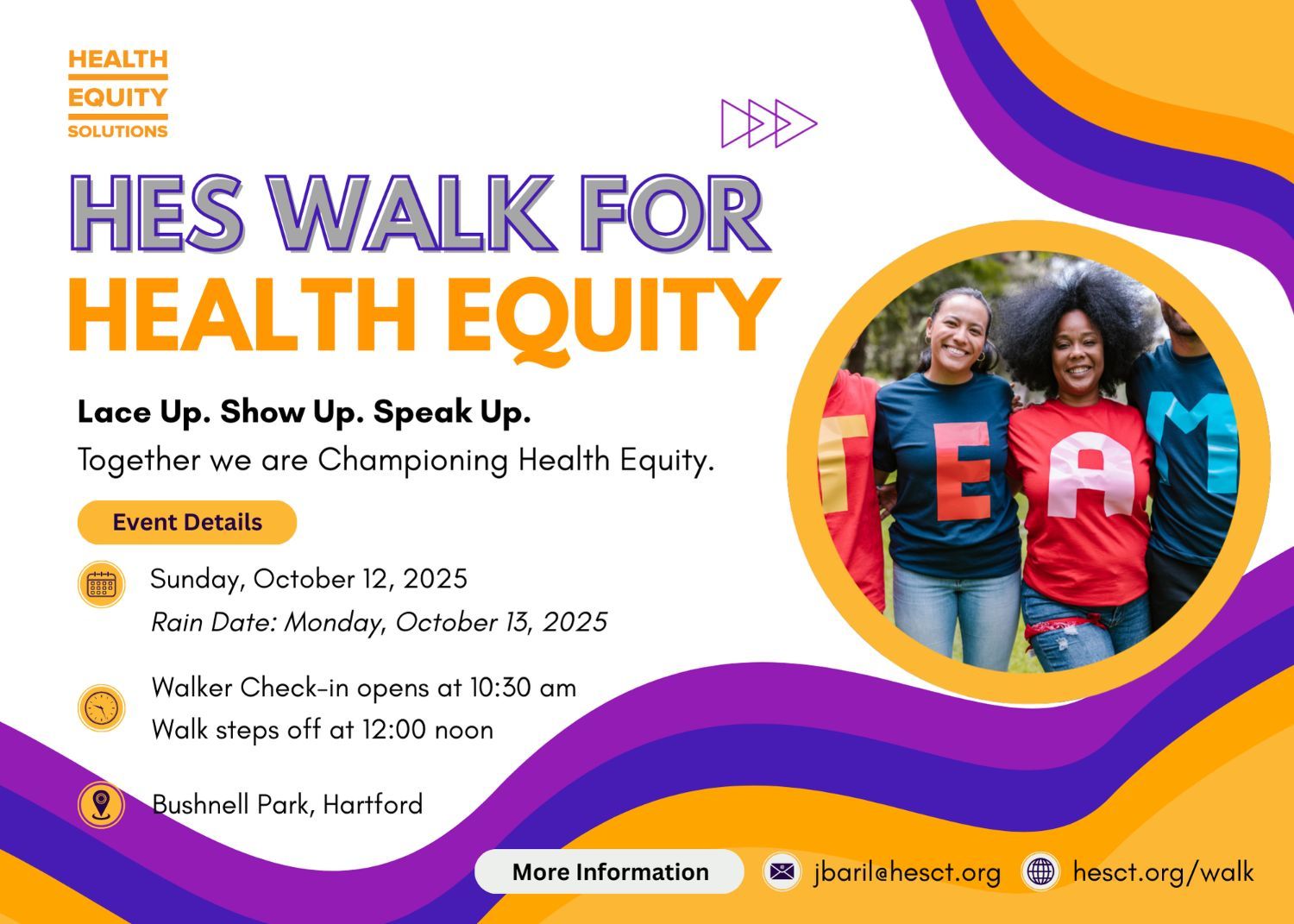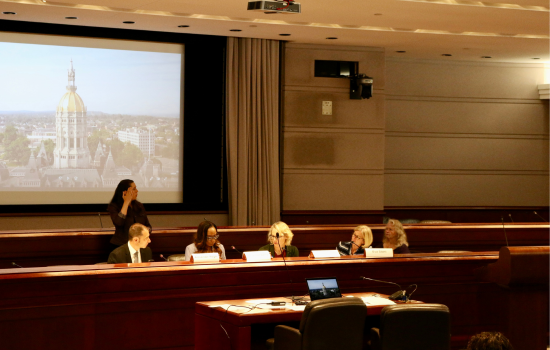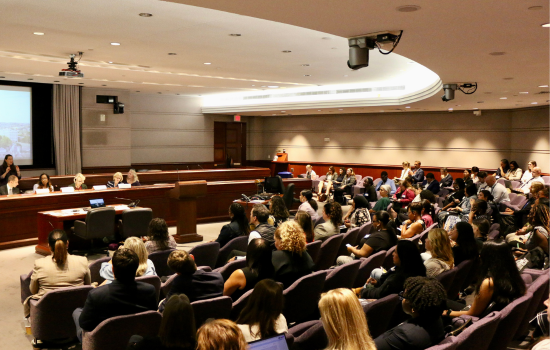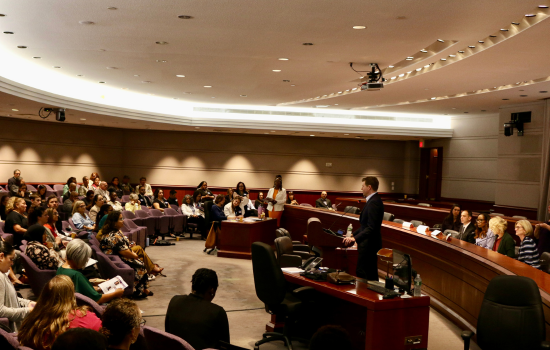 | Friend, welcome to Health Equity Solutions' monthly newsletter! | | On Sunday, October 12, 2025, Health Equity Solutions will host its first-ever Walk for Health Equity in downtown Hartford—and we want you to be a part of it. It’s more than a walk. It’s a powerful show of solidarity, awareness, and action. Why it Matters:
Because every Connecticut resident deserves the chance to live a long, healthy life—regardless of their zip code, income, or background. Health disparities aren’t just statistics: they’re real people experiencing unequal access, unequal care, and unequal outcomes. Your participation helps amplify voices, fund vital programs, and push forward anti-racist policies so that health equity is not just an aspiration, but a reality. Our Goal:
We aim to raise $50,000 to support Health Equity Solutions’ work in community conversations, health equity advocacy, and policy change. Every dollar helps to strengthen initiatives like outreach, training anti-racist leadership, and ensuring that everyone in CT has fair access to health. What to Expect:
Fun for the whole family with pre-walk wellness & yoga, food and entertainment, and a chance to connect with neighbors, health activists, and local leaders. How You Can Help: -
Register to walk (or form a team) -
Raise or donate funds toward the goal -
Bring friends, family, coworkers—more voices make more impact -
Spread the word via social media, newsletters, or just chatting Mark your calendar, lace up your shoes, and join us in making health equity visible. Together we walk, together we change lives. | | | |  | | | | | | | Session Updates: Health Equity Solutions' 2025 Special Session Priorities To prevent coverage losses and protect the health of our communities, we are asking legislators to: Require DSS to collaborate with enrollees when designing new systems. While work reporting requirements don’t take effect until 2027, decisions about the build-out of the systems and processes that will implement these requirements must happen before 2026. We should not build a new software without asking the end user for input. Similarly, it would be inefficient at best to build new reporting systems without input from the enrollees who will have to use them. Connecticut must ensure these new systems are rolled out with meaningful input from the communities most affected if we are to avoid disenrolling thousands of people who are already working or exempt from work requirements.
Invest in Community Health Workers and community-based organizations to support messaging, outreach, and logistics. Trusted messengers like community health workers and community-based organizations are essential to help residents navigate new rules and maintain coverage in the simplest of times. In addition to work reporting requirements, recent federal laws and regulations will change how HUSKY and Access Health determine eligibility, leading to significant premium increases and widespread confusion. Helping people understand and navigate these changes will keep people covered.
Commit to maintaining Covered CT. In January, enhanced premium tax credits expire, increasing the cost of Covered CT for the state. In addition, immigrants who have been in the U.S. for less than 5 years will lose access to subsidies and, as a result, to Covered CT. If the legislature does not act by January, over 5,000 Connecticut residents could become uninsured, and coverage for over 45,000 could be at risk. Preserving Covered CT is essential to protect access to care, prevent rising uncompensated care costs, and ensure stability in the state’s health care system. | | | | ICYMI: The Community Catalyst is raising awareness about healthcare costs and has initiated a campaign to tell Congress to make enhanced Premium Tax Credits permanent now! Join HES and many other national organizations by sharing the sign-on letter with your network. - Learn more HERE about what's at stake, then join the campaign and share with your network HERE.
| | | | | | | | Health Leaders and Lawmakers Unite Against Federal Cuts On September 4, in partnership with the Commission on Racial Equity in Public Health, we hosted a forum that brought together healthcare providers, lawmakers, and policy experts to discuss the recent federal cuts to healthcare. The speakers at the forum shared how these cuts will impact CT residents, solutions to reduce the cuts, and explored what could be done to mitigate the damage to health coverage in our state. Special thanks to our partners: Commissioner Andrea Barton Reeves, Deputy Commissioner Peter Hadler, James Michel, Comptroller Sean Scanlon, Sabrina Corlette, Eva Stahl, Alexander Reger, Dr. Linda Barry, Access Health CT and CT Department of Social Services. | | | | | | | |  | L to R: Alexander Reger, Dr. Linda Barry, Ayesha R. Clarke, Sabrina Corlette, Eva Stahl and Pareesa Charmachi Goodwin. | | | | |  | Panelist share insights about healthcare cuts and offer recommendations to address current needs. | | | | |  | Audience listens in as panelists share how federal cuts will impact CT residents. | | | | |  | Comptroller Sean Scanlon address the audience and shares his take on the impact of federal healthcare cuts. | | | | | | Ayesha R. Clarke Joins Advocates in New Video to Highlight the Impact of Healthcare Cuts On September 4, our Executive Director Ayesha R. Clarke opened the Staying Covered: Responding to Federal Cuts to Healthcare forum with remarks followed by the premiere of, "The Impact of Cuts On the Front Line." The video highlighted how funding cuts affect health care systems, providers, and residents statewide, while Clarke underscored the need to center impacted communities in shaping real solutions. Click the button to watch the video and see what Ayesha and other advocates had to say. | | | | | | Karen Siegel Responds to Insurance Rate Hikes A recent CT Mirror article highlighted that the Connecticut Insurance Department has approved steep premium hikes for 2026 health plans—an average of 16.8% for individual policies and 11% for small group plans, impacting about 224,000 residents. Officials cited federal cuts to Medicaid, expiring subsidies, and new restrictions on community health centers as key drivers. Our Deputy Director, Karen Siegel warned, “These increases are going to be difficult to impossible for families to accommodate, and people will lose coverage. Given all the changes coming to the [insurance] marketplaces in the next few years, rates are going to continue to go up, and the state has an obligation to contain costs.” | | | | | | HES and Connecticut Citizen Action Group Hosts Advocate Forum On September 17, Kally Moquete, Senior Manager of Policy and Advocacy at Health Equity Solutions and Liz Dupont-Dehl at Connecticut Citizen Action Group hosted an advocate forum. At the forum, 12 organizations and coalitions were present to strategize how to mobilize around HR-1's impacts on Healthcare Access and Affordability for the state's most vulnerable communities. The discussion also included community priorities and information about the Medicaid defense coalition work. | | | | | | Ayesha R. Clarke Joins Senator Lesser and Other Advocates to Celebrate "Check the Box" Initiative On September 18, Ayesha R. Clarke joined Senator Lesser, state leaders and public health advocates to celebrate the success of Connecticut’s “Check the Box” initiative. The program, which allows residents to receive health insurance information when filing state tax returns, led to nearly 1,900 households enrolling in coverage. The event highlighted the power of simple policy changes to expand access to care and reduce the number of uninsured residents across the state | | | | | | | | | | We love to highlight the work of our partners and interesting events in the health equity neighborhood. Have content to contribute? Fill out this form. We're eager to learn about what you're working on. Know someone who might be interested in receiving our newsletter? Share this subscription link! | | | | Data for Democracy - Serving Clients Safely: Data Protection Strategies for Uncertain Times - October 7 Join Dr. Eric Giannella of the Massive Data Institute to learn: -
How to protect the data of those they serve through quick, actionable safeguards that don't require new technology. -
Practical steps for assessing whether certain types of personal data can be stored separately or made less sensitive and still meet mission needs. -
When to retain versus delete sensitive information to balance program effectiveness with privacy protection. This session addresses the urgent issue facing nonprofits today: sensitive data in government and nonprofit repositories are increasingly being accessed in ways that violate laws and regulations, potentially undermining the trust people place in organizations when seeking critical services. | | | | | | A Roadmap to Fully Funded Communities - Multiple Dates The Connecticut Voices for Children is hosting a series of community conversations where they'll share new research on the State’s fiscal controls (or what politicians are calling “fiscal guardrails”) that will shed light on how Connecticut can raise revenue to invest in all of our children and families. The events is free and will include dinner, child care, and translation services. 📍 Upcoming stops: New London (Sept. 25), New Britain (Oct. 30), and Middletown (Nov. 20) | | | | | | | | Stay informed about the latest developments in health equity, social determinants of health, racial justice, and more! Every week, we feature relevant news articles and reports on our social media. Check out a few highlights below: | | | | - Black communities, shaken by Trump cuts, feel ‘left behind again’: The Washington Post reports that the Trump administration has canceled nearly two dozen environmental and health projects aimed at addressing pollution, flooding, and sanitation crises in Black communities across the South. These cuts halt efforts such as upgrading failing sewage systems in Alabama, preventing flooding in Virginia, and monitoring toxic air in Louisiana’s “Cancer Alley.” Advocates warn that the rollbacks deepen racial inequities, leaving communities vulnerable to health hazards and environmental neglect. Read the full story HERE.
- Health leaders warn thousands could lose coverage under Federal Health Bill: Health leaders in Connecticut are warning that the newly signed federal health bill could strip coverage from more than 200,000 residents. The law includes $500 billion in Medicaid cuts over the next decade, threatening access to care in cities like Hartford, New Haven, and Waterbury. Advocates stress that the changes will ripple statewide, leaving families struggling and increasing strain on the healthcare system. Read the full story HERE.
- Over 100K CT residents could lose Medicaid coverage. What towns may be hit hardest?: A new CT Data Haven analysis shows the federal One Big Beautiful Bill Act could cost nearly 13,000 Hartford residents their Medicaid coverage, about 11 percent of the city’s population, and one of the highest in the state. Other hard-hit towns include Bridgeport, and Waterbury and New Britain, each projected to lose thousands of Medicaid enrollees. Read the full story to find out which towns will be hit the hardest. Read the full story HERE.
| | | | | | | | Health Equity Solutions
53 Oak Street | Hartford, Connecticut 06106
860.461.7637 | info@hesct.org | | | | | | | | | | | | | | | |